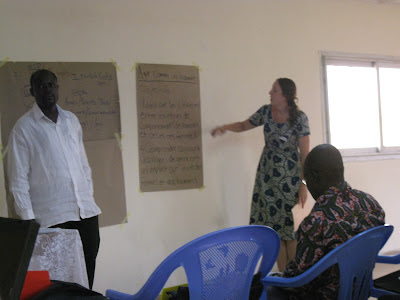So I’ve just completed my first big project as a Peace Corps
volunteer. I organized and implemented a formation for the teachers of my
canton on the concept of Men as Partners. It was at my PDM (a week long
training for volunteers and their homologues) back in April that I decided one
of the projects I wanted to do was a Men as Partners (MAP) formation.
So, what’s MAP? Basically the concept is that you cannot
implement change without first having the men onboard. I could talk to girls
about going to school or women about the importance of self-confidence, but if
their fathers and husbands are against it then you’ll get nowhere. Men as
Partners does what the name says; it trains men to be partners to their wives,
mothers, daughters to improve their lives and the community.
My predecessor did a MAP formation with another volunteer.
There were not that many people from our area who were trained since the
participants were divided between the two areas. When I first arrived to
village I spoke with several of the attendees and none of them had done
anything with their MAP training.
I think the biggest obstacle from them was that they were
unsure how to actually use the information they received. They came from so
many spears (farmers, patrons, teachers, health care professionals, and
businessmen) that it was impossible to give them concrete ideas on how to use
MAP in their sectors and community. I chose to train teachers because the
school system is very organized and if the higher ups are involved then the
teachers are obligated to utilize the information they received. So, I
concentrated on teachers from the various villages of my canton.
First, I planned the program alongside my homologue Mr.
Hankpada. I developed a budget and filled out the SPA (Small Projects
Assistance) grant. I received approval for my project in July and from there it
was go go go to plan this huge event.
I had to negotiate with the hotel, plan the schedule, write
invitation letters, choose trainers, make copies of the manual, buy all the
supplies (folders, pens, flipcharts, tape . . .), and print certificates. I
also made trips to each village I was inviting to my formation to speak with
the Director. I explained what MAP consisted of and how it would beneficial to their
school. Additionally, we discussed that as a part of sending a teacher to this
formation I expected upon their return that they would instruct the others
teachers on MAP.
(Each participant recieved a folder, notebook, pen, name tag, program, and a copy of Leve-toi la jeune fille (a magazine made my Peace Corps Gender and Development Committee)
(Certificate for one of my organizors. All the formateurs and participants all recieved certificates)
My canton is made up of 42 villages with Asrama as the
center of the canton. I invited every school in my canton to send two teachers
(seven villages in total). I also invited teachers from the four schools in Notse the
city I held my formation. There were a total of 15 participants and I had six
trainers. Also, since I am now considered a second year volunteer I hosted two
new volunteers (Emily and Kelsey) who were observing my formation as a part of
our shadowing program.
We did the following sessions: Learning about Gender, Act
Like a Man (concerns how society dictates what we view as the proper “behavior”
and concepts of what it means to be a man and woman), Looking at Oppression, Caring
for Oneself: “Men, Gender, and Health”, Effective Communication, Sexual Consent,
Sexual Harassment, Healthy and Unhealthy Relationships, HIV and AIDS Myths and
Facts, HIV and AIDS Prevention, and What is Violence?
(Madame Rose talking to the participents about the importance of Men as Partners)
(The session for Learning about Gender which Emily the new volunteer did with one of my Togolese formateurs. This game demonstrates gender inequality. So you form two teams one representing women and the other men. The "women" carry a baby on their back, a bucket for fetching water, a book for school, and a broom to swep. These things symbolize all the work grils have to do. The boys have a machetti to farm and a book for school Its a relay race to show to inequality of work distribution).
(Emily and Bikore leading their session Learning about Gender. Bikore is a teacher from my Lycee who was just moved to Wahalla)
(Kelsey and my homologue Hankpada doing their session called Act Like a Man, which discusses how society decides the ideas of what men and women should do and how they should behave themselves. It also coveres how that could possibly lead to problems)
(Participants doing group work. The formateur standing on the left is Sama and was a homologue in Glei for a COSed volunteer Jes)
(Me and Mr. Perry who was a hologue of Jes from her village. He was a great formateur and has done a lot of work with PCVs. Right now we're singing a song to get people moving a little before starting our sessions)
(Alphonse s the one in green. He's one of my friends and he also teaches English in Notse. Next to him is Bikore. They are leading a session about the Mythsand Realities of HIV/AIDS)
(Sama and Hankpada leading a session on sexual consent and sexual harrassment)
(Im teaching a session about animation techiniques to the participants)

















